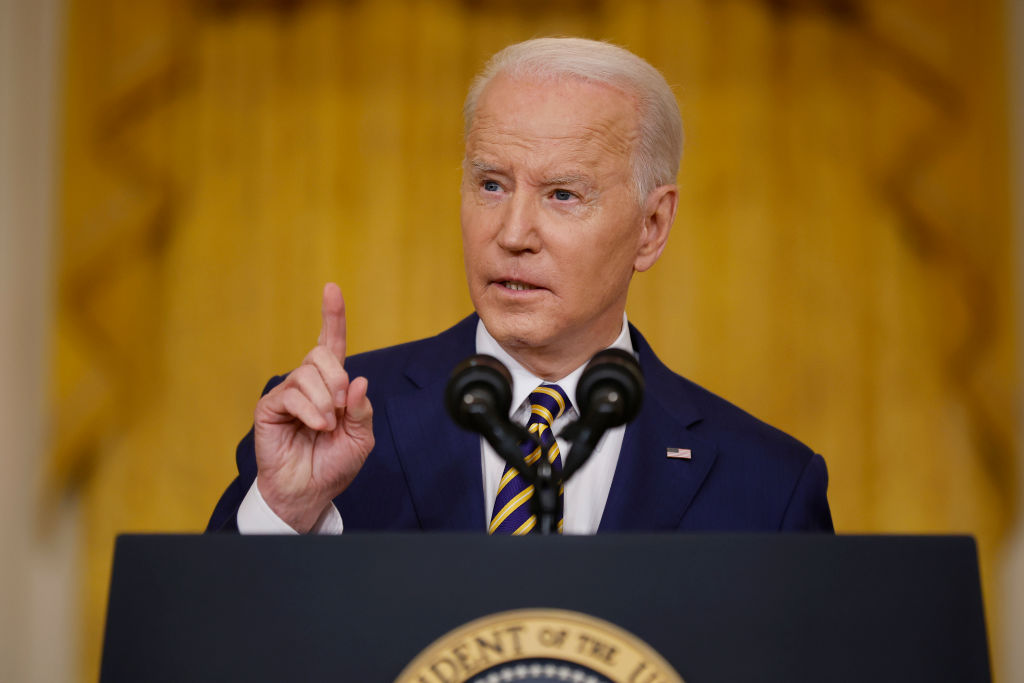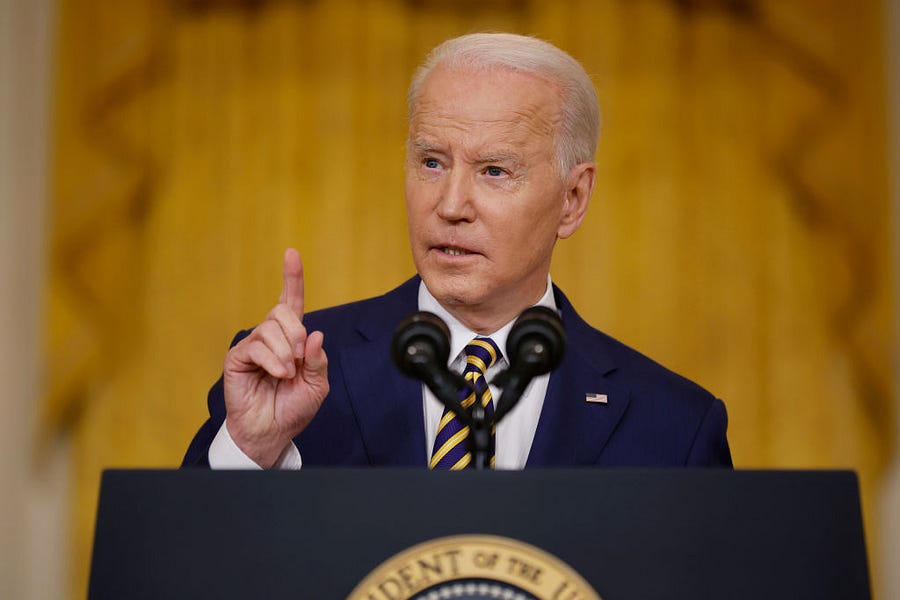
President Biden came into office in a strong position on health care, but broader strategic mistakes and limited ambitions are restricting what is possible even at this early stage of his term. Two consequential changes—expanded Affordable Care Act subsidies and prescription drug price controls—might still get approved by Congress, but even their enactment would fall short of the hopes and expectations of his party’s most active supporters. Disappointment over a missed opportunity now seems likely.
Underachievement was not inevitable. Biden delivered a surprisingly able performance on health care during his party’s 2020 primaries. He was the most vocal opponent of Medicare for All, which was championed by many of his rivals, including Sens. Bernie Sanders and Elizabeth Warren. Staking out a more moderate position—with conviction—was central to his victory. It turns out that many Democratic primary voters are no more eager than independents or Republicans to pay higher taxes, or lose their private insurance, in return for a single-payer plan.
In retrospect, Biden’s views on a Canadian-style health system should be seen as an extension of a more general political instinct, which is to play it relatively safe on health care. It is not so much that he opposes Medicare for All on principle as that he sees it as an impossibly dangerous political project. His main argument against it was its cost, and the immense tax increase it would require, not that the government would deliver inferior care. He has seen firsthand the political damage big reform plans can inflict. He was vice president during the bruising battle over the Affordable Care Act in 2009 and 2010, which helped flip control of the House, and he saw Bill Clinton’s presidency nearly collapse over an epic health-care failure in 1994, which led to a GOP House for the first time in four decades. He has no interest in repeating those episodes, which means he instinctively steers away from controversial schemes.
The one exception in his campaign platform—a public option—proves the rule. Biden pushed this idea as the main alternative to Medicare for All, and it is certainly popular among Democratic voters. A public option would give consumers the choice between staying with private insurance or opting for a government-run alternative. There would be no coercion. And yet it is one thing to debate this idea during a campaign, and quite another to try to get it through Congress. Needless to say, the insurance industry is not eager to see the federal government become a competitor. After the close results of the 2020 election, the Biden team quietly set aside the plan, and he has rarely mentioned it since.
What is left of the Biden health agenda is really two prominent proposals: an expansion of public subsidies for enrollment in ACA coverage and price controls on prescription drugs. Both are still in play, but their prospects have dimmed with the collapse of the administration’s legislative strategy.
The expansion of the ACA got a running start in the $1.8 trillion COVID response plan Biden signed into law in March. Among its provisions was an increase in premium credits for households purchasing private insurance through the ACA’s system of state-based exchanges. Under the original ACA law, households with incomes below 400 percent of the federal poverty line (FPL) are eligible for discounted premiums based on a schedule tied to annual incomes. Families with incomes between 100 and 133 percent of the FPL were required to pay about 2 percent of their incomes to secure coverage; the government would pay the balance. At 200 percent of the FPL, the required premium payment was capped at 6.5 percent of income. Above 400 percent of the FPL, there was no subsidization.
The 2021 law increased the subsidization of premiums for all income levels through 2022. Families with incomes below 150 percent of the FPL can now get a benchmark ACA plan for free. Further, even households over 400 percent of the FPL—$111,000 for a family of four in 2022—are now eligible for support, with their premiums capped at 8.5 percent of their incomes.
The Biden administration, along with almost every House and Senate Democrat, wants to extend the higher level of premium support beyond this year, and eventually permanently. That certainly remains the most likely scenario, given the history of entitlements. It is rare for Congress, even when Republicans are in control, to let benefits lapse after households become accustomed to them. The House version of the administration’s Build Back Better plan includes an extension through 2025, at a cost of $74 billion. Permanent extension would add another $220 billion to the federal budget through 2031.
But this year may see a break from the usual pattern. The apparent collapse of Build Back Better in the Senate has created uncertainty over the fate of the ACA subsidies. If Congress fails to pass any version of BBB, it is possible that Democrats will have no pathway for enacting an extension given the likely opposition of most Republicans. The real possibility of a GOP takeover of the House, Senate, or both in the midterms further complicates the outlook.
The other major reform that is still standing—pricing limits for a subset of prescription drugs—is caught up in the same turmoil. The president has embraced the long-standing Democratic goal of direct negotiations between the federal government and the pharmaceutical industry over prices, which would then apply both within Medicare and private insurance. Divisions within the Democratic Party already have scaled back the reach of the emerging plan, but it could fall away entirely if the BBB is not resuscitated in some form. Sen. Joe Manchin is not the obstacle to these specific reforms (in fact, he has expressed unqualified support for them), but his opposition to the overall BBB construct imperils them nonetheless, because without BBB they cannot pass in the Senate.
Even without legislation, however, the Biden administration still has options to advance its party’s goals in health care—if it chooses to use them. The administration has substantial regulatory authority in the health sector that could be directed toward solving obvious problems, such as high prices for certain services. Most Democrats would like to see the federal government exert more control over costs, but embracing an aggressive plan carries risks too: The affected industries will resist and have some allies within the party. The president’s caution, not surprisingly, is influencing his top health officials, who are limiting what they will implement independently of legislation from Congress. Among other things, the administration has no clear plan for slowing rising costs, which is the principal defect of the current system and a major complaint of consumers. Price controls for prescription drugs will not solve that problem, as they account for just 10 percent of overall spending. The administration has yet to describe how it will check expenses for hospitalizations, physician services, or other types of care.
The alternatives to tighter price controls are stronger competitive forces and better management practices. The administration seems indifferent to both. It is pursuing stricter antitrust enforcement among hospitals and other providers of services, which is long overdue but unlikely to produce tangible results anytime soon. Meanwhile, it says it supports a signature initiative of the ACA years—accountable care organizations, which are provider-led managed care entities—but it has yet to offer a plan to improve upon their modest results.
It might have been possible to explain the administration’s reticence to the demands of the COVID-19 pandemic, which is understandably its primary focus in health care. But, even as cases spike once again, the administration is still pushing for child tax credits, universal pre-K subsidies, expanded childcare support, and new subsidies for a less carbon-intensive energy industry. There would be room for a serious plan to control health costs if the administration had one it was eager to execute. Some combination of lack of conviction and fear of a tough fight seems to have held it back.
The real risk for President Biden is that he will go into 2024 without much to show for his time in office. Within the Democratic party, health care is never far from the surface. Four years of drift would embolden the advocates of a more radical agenda. These progressives were trounced by Biden in 2020, but his hand would be considerably weaker if he (or a successor) enters the next battle emptyhanded.
James C. Capretta is a senior fellow and holds the Milton Friedman Chair at the American Enterprise Institute.






Please note that we at The Dispatch hold ourselves, our work, and our commenters to a higher standard than other places on the internet. We welcome comments that foster genuine debate or discussion—including comments critical of us or our work—but responses that include ad hominem attacks on fellow Dispatch members or are intended to stoke fear and anger may be moderated.
With your membership, you only have the ability to comment on The Morning Dispatch articles. Consider upgrading to join the conversation everywhere.